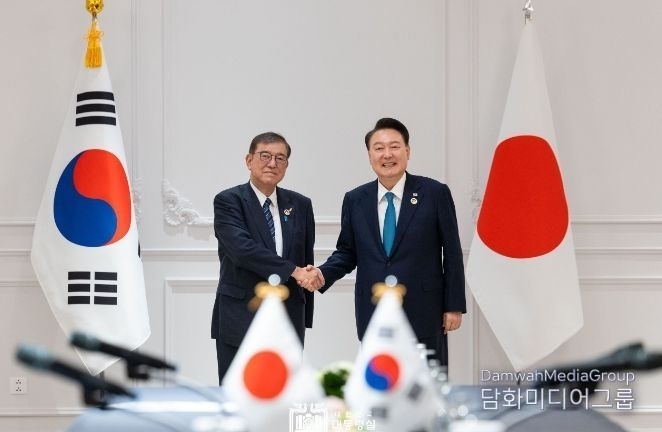By Diplomacy Journal Lee Jon-young
President Yoon Suk-yeol, who is visiting Vientiane, Laos, for the ASEAN-related summit, held a bilateral meeting with Japanese Prime Minister Shigeru Ishiba for about 40 minutes on October 10.
The two leaders appreciated that the first face-to-face meeting between the leaders of Japan and South Korea was held just ten days after Prime Minister Ishiba took office, and decided to continue to meet and communicate closely whenever possible, including through shuttle diplomacy, to further accelerate the development of bilateral relations.

The two leaders agreed that the positive trend in bilateral relations is largely due to the strong relationship of trust between the two leaders. The two leaders also agreed to continue to identify concrete achievements that can be felt by the people of the two countries and to work together to make next year's 60th anniversary of the normalization of diplomatic relations between the two countries a historic milestone in bilateral relations.
The two leaders acknowledged the close cooperation between the two countries in dealing with the increasingly tense security situation, including North Korea's nuclear and missile provocations and illegal military cooperation with Russia, and agreed that the two leaders will continue to provide leadership in sending a unified message to the international community against North Korea.
In this regard, Prime Minister Ishiba expressed his support for President Yoon's “August 15 Unification Doctrine” and for a free and peaceful reunification, and the two leaders agreed to continue to work together.
The two leaders also acknowledged the unprecedented level of cooperation among South Korea, the United States and Japan since the Camp David Summit in August last year and agreed to continue working together to further strengthen the process of trilateral cooperation that contributes to peace and prosperity in the region and the world.
The two leaders agreed that there is a growing need to strengthen bilateral cooperation on regional and global issues, and decided to further expand the horizons of bilateral cooperation in the international arena, including the United Nations and the G20.


